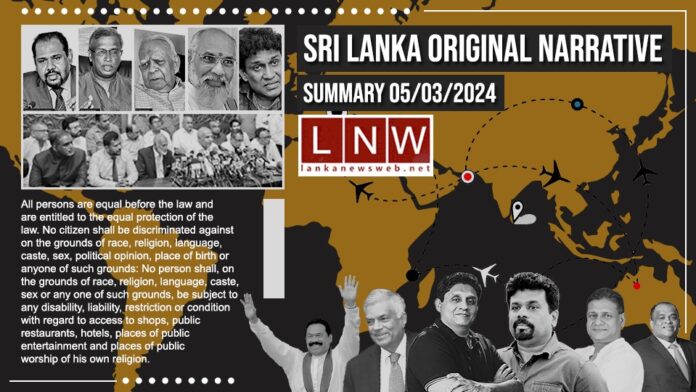- President Ranil Wickremesinghe reveals that over the past 14 months, the Parliament has enacted 42 new laws to facilitate the country’s economic transformation: highlights the necessity of passing an additional 62 laws through Parliament: underscores that if this cannot be achieved in the current parliamentary session, the bills will be reintroduced in the subsequent session for approval.
- Opposition Leader Sajith Premadasa has voiced concern over economic malpractices, alleging certain entities of monopolising state resources and infringing on citizens’ rights: promises decisive action under an SJB administration, vowing legal scrutiny for the ‘economic terrorists’ responsible and efforts to restore appropriated assets to the Sri Lankan populace.
- Basil Rajapaksa, founder of SLPP, returns to Sri Lanka after a trip to the USA: mentions no official decisions have been made on election candidates: affirms his commitment to leading SLPP’s election preparations, irrespective of their type.
- S.C. Muthukumarana, representing the Sri Lanka Podujana Peramuna (SLPP), sworn in as a member of Parliament: Muthukumarana fills in the parliamentary seat vacant upon the resignation of Uddika Premaratna.
- CEYPETCO has announced a fuel price reduction effective from midnight on March 04. Petrol 95 Octane will be Rs. 447 per litre (down by Rs. 9), Super Diesel will be Rs. 458 per litre (down by Rs. 10), and Kerosene will be Rs. 257 per litre (down by Rs. 5). However, prices for Petrol 92 Octane and Auto Diesel remain unchanged. Lanka IOC and Sinopec have pledged to adjust their prices in line with CEYPETCO’s revisions.
- The Sri Lanka Administrative Service Association (SASA) expresses concerns over the recent salary increase for Sri Lanka Administrative Service officers by the Central Bank: stresses the importance of CB officials having a broader understanding beyond economics, including knowledge in social sciences: highlights potential social unrest and urges consideration of historical context and disparities in decision-making: emphasises the need for a holistic approach considering societal impacts and long-term consequences.
- CEB concluded fiscal year 2023 with notable profitability, reporting Rs. 75.7 billion in profits, with Rs. 61.2 billion from the Board: Factors include increased rainfall and a tariff hike in Q423: Revenue totaled Rs. 679 billion, resulting in Rs. 132 billion gross profit: Distribution costs reduced by 13.7%, and other expenses by 15.3%. Finance income increased by 29%, with a 42.8% rise in finance costs: However, recent scrutiny revealed an overestimation of costs by Rs. 140 billion, emphasising the importance of accurate financial management.
- The Public Utilities Commission endorses a tariff modification, effective from midnight on March 4, resulting in a 21.9% reduction overall: Following a review of proposals by the Ceylon Electricity Board (CEB), the PUCSL determined this reduction, offering significant relief across consumer categories, notably reducing tariffs for domestic consumers by 33% for those using less than 30 units of electricity: Other sectors will also see reductions ranging from 18% to 33%: Additionally, the CEB has been instructed to settle outstanding payments to renewable power plant owners and formulate plans to meet renewable energy targets by 2030.
- Dr. Benjami Reyes, Secretary General of Colombo Plan (CP), met with Saudi Arabian Ambassador to Sri Lanka Khalid Hamoud Alkahtani to discuss maritime sector cooperation: explore infrastructure, capacity building, and trade facilitation: The Saudi Ambassador expresses optimism for future collaboration with CP: Meanwhile, the United States funds key projects of the CP, including a three-year capacity building programme for the Sri Lanka Ports Authority.
- Tourism is thriving with a surge in visitors, attributed to visa-free travel for tourists from key countries like China, India, and Russia: Over 200,000 tourists arrived in January 2024, marking a 103.1% increase compared to last year: Russia leads arrivals with 15%, followed by India: Sri Lanka anticipates welcoming 2 million visitors in 2024, potentially generating $6 billion in revenue.

